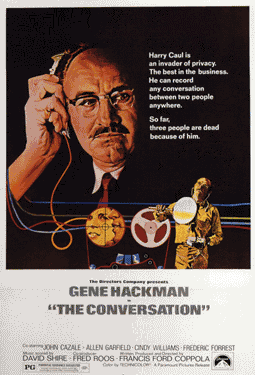Private / Public / Internet: Private Realms
Home / Morality Tales / Private Realms / Public Realms / Corporate and Individual / Utopia/Dystopia / Projects
 |
PolS 486 / CAPP 479
" . . . the right to be left alone---the most comprehensive of rights and the right most valued by civilized men."
Louis Brandeis
Page Two
Thursday, January 22, 2004
Internet Metaphors
We are accustomed to using metaphors to describe things to others. But the specific metaphors we use have a way of shaping others' understanding and expectations of a given phenomena as well as their approaches to it. Thus, if one defines 'international terrorism' as any act of violence against the United States, this definition will have different implications for our behavior than one based upon a narrower definition. It will also have a major impact on the way we view our options.
Similarly, our views of the Internet are shaped by the metaphors that are used to describe it. Although it is not always apparent, the experience of exploring or 'surfing' the Internet has been captured in many different ways, some of them mutually exclusive.
Read the following essays in your Reader:
Jonathan Katz, "Birth of a Digital Nation," WIRED, Issue 5.04, April 1997
Alfred C. Yen, "Western Frontier or Feudal Society?: Metaphors and Perceptions in Cyberspace," Berkeley Tech. L. J., 2002
Jonathan Rosen, The Talmud and the Internet (Farrar, Straus & Giroux), selections
As you read these essays, ask yourself the following questions: 1) What Net metaphors are the authors using and how do they differ?; 2) Which of these metaphors corresponds most directly to your own use of the Net? It's conceivable that you experience combinations of these descriptions. But is it possible that you could experience all of them simultaneously? Finally, 3) What are the implications of each of these metaphors for our understanding of the world we live in. Does our choice of metaphors actually matter?
Practical assignment: Visit Google's Website. Ask yourself which of the three metaphors best describes your Google experience. Second, go to Google's Services page and determine which metaphor Google would most like to use to define itself.
One extremely interesting page outlines Google search patterns, and then breaks them down according to subjects and countries.
It's hard to know how to contact Google, but one might begin here:
Consumer PR
Eileen Rodriguez
+1.650.623.4235
eileen@google.comIdeally the best people to contact would be its co-founders: Sergey Brin and Larry Page. I could only find old Stanford addresses for them. I challenge you to do better. It would be interesting to converse with them about Google's founding philosophy.
|
|
Page Three
Tuesday, January 27, 2004
The American Idea of Privacy
Read the Fourth Amendment closely. What does this amendment have to do with privacy? What guidance does it give to public officials? To what extent do citizens have privacy? What word is missing in this amendment?
Fourth Amendment: "The right of the people to be secure in their persons, houses, papers, and effects, against unreasonable searches and seizures, shall not be violated, and no Warrants shall issue, but upon probable cause, supported by Oath or affirmation, and particularly describing the place to be searched, and the persons or things to be seized."
Robert Ellis Smith's book, Ben Franklin's Website (see reviews on this link), will give you some ideas about both the evolution and the content of the American concept of privacy. Read the chapters in the book corresponding to the following words: "Watchfulness" "Serenity," and--for ways of understanding the concept of privacy in American Constitutional interpretation--"Brandeis."
For Smith's views on the 'top ten myths about privacy', watch this video (30+ mins.) In this talk, Smith frequently refers to a top privacy site, epic.org. Smith himself is the publisher of a similar site, Privacy Journal.Why is personal privacy such an important part of American culture? At the same time, why are we still inclined, arguably more than most liberal societies, to place limits on personal privacy (e.g., what we read, what we look at)? Or is it just a matter of other societies placing different limits on personal privacy? How does any liberal society maintain an appropriate balance between the basic right to privacy and behavior that is purportedly excessive or corrupting? Or should we be able to do absolutely anything we want in the 'privacy' of our own home?
Group Assignment: Contact Smith and ask him a question about the readings above. ellis84e@ma.ultranet.com.
Page Four
Thursday, January 29, 2004
Digital Paranoia: Am I Being Watched?
In this section, we will consider some well-known threats to our privacy that emerge from the Internet. There are two questions I wish to consider: 1) Whether or to what extent our privacy is actually being threatened; and 2) If our privacy is being threatened, how this condition has come to pass. Is the loss of privacy something that is being done to us? Or have we somehow acquiesced to our loss of privacy?
A Three-Part Assignment:
1. For background Reading, read "Cyberspace" in Robert Ellis Smith, Ben Franklin's Website (which you own).
Then, contrast Karen Coyle's argument about the loss of privacy, "Privacy or Paranoia," with Amitai Etzioni's reasoning about the same subject in "The Hyper-hyping of Privacy." Both of these articles are in your reader.
2. How much of a threat to my privacy is represented by the Internet? Reflect upon possible answers to this question by considering each of the following topics:
a. The threat from 'cookies':
Why are advertisers interested in me?
Why are cookies not as bad as they seem (or, so say some people)? This site may be down. If so, try Network Advertising Initiative (NAI).
How cookies can be justified according to the law.
b. The threat from 'spam' and 'spyware':
What can pop-ups do for you (or, so we are told)?
Will the Can-Spam Act of 2003 work?: Yes! versus No!
The Spies from Cydoor: go to 'Support,' then 'FAQ'
c. Contact the marketing people at Cydoor or Gator/Claria, and ask them how they justify their use of spyware and/or why they prefer opt-out policies for consumers rather than opt-in. On the subject of cookies, there are email links for the NAI site above ( nai@networkadvertising.org), or Double Click (privacy@doubleclick.net ), or Jupiter (privacy@bitpipe.com)
(The Cydoor links worked on one of my computers but not on the other; I don't know why. Interestingly, if you go to the most notorious marketer of spyware, CommonName, you will see that ND has blocked it).

Page Five
|
Page Six
|
